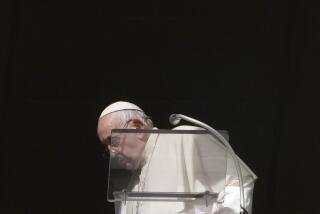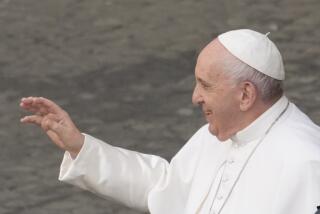Pope celebrates his first U.S. Mass at a brand-new stadium
WASHINGTON — Pope Benedict XVI celebrated a colorful, open-air Mass with thousands of eager faithful at Washington’s just-opened baseball stadium Thursday and later urged church educators to work to strengthen Roman Catholic identity in their schools and universities or risk “confusion” for the young.
On the third day of a U.S. visit that takes him to New York today, the pope also addressed representatives of non-Christian faiths and held a small, separate gathering with Jewish leaders in honor of the Passover holiday. Benedict met privately with a small group of victims of the clergy abuse crisis that he has repeatedly acknowledged this week has badly shaken the U.S. Catholic Church.
In the widely anticipated address to Catholic educators, the pope emphasized that the church’s teachings should shape “all aspects of an institution’s life, both inside and outside the classroom.” His audience included presidents of the nation’s Catholic colleges and universities, and school superintendents from its 195 dioceses.
A former university professor, Benedict reiterated his earlier statements of support for academic freedom, calling it a “great value,” but suggested that it might also have some limits at a Catholic college.
“In virtue of this freedom you are called to search for the truth wherever careful analysis of evidence leads you,” he told the educators at Catholic University. “Yet it is also the case that any appeal to the principle of academic freedom in order to justify positions that contradict the faith and the teaching of the church would obstruct or even betray the university’s identity and mission.”
Catholic schools’ mission, he added, could not be “somehow autonomous or independent” from that of the church.
The tension between academic freedom and fidelity to church teachings is a perennial issue for Catholic schools, especially for many of the well- regarded institutions of higher education among them. In recent years, some Catholic universities have been criticized by local bishops for straying from Catholic beliefs inside or outside the classroom. Some have allowed campus speakers supportive of abortion rights or stem cell research, for example, or permitted productions of controversial, secular plays.
In Catholic universities as well as grade schools, the pope said, teachers and administrators have a duty to ensure that students learn about Catholic doctrine and practice. Any divergence from “public witness to the way of Christ,” he said, weakens Catholic identity and “inevitably leads to confusion, whether moral, intellectual or spiritual.”
Nonetheless, the pope praised what he called the “remarkable network” of Catholic schools in the United States, which includes the most extensive collection of Catholic universities and colleges in the world. He also lauded the role of Catholic schools in teaching generations of immigrants, helping them overcome poverty and enter mainstream American society.
After the speech, several of those in the audience said they appreciated both the pope’s desire to meet with them, and the warm, supportive tone of much of his speech.
“I was very touched by the fact that he really emphasized the importance of our schools and our work,” said Patricia Tierney, superintendent of schools for the Diocese of St. Augustine in Florida.
Father Paul Locatelli, the president of Santa Clara University in the Bay Area, said he appreciated the pope’s emphasis on the importance of the search for truth, in universities and elsewhere.
“I think he was seeking to broaden the questions we ask to include the mystery of God and the mystery of life, not to limit anything,” Locatelli said.
The 81-year-old pope began the hectic day by celebrating his first Mass in the U.S., telling the crowd of 46,000 at Nationals Park that society needs an active, enthusiastic Roman Catholic Church.
“Who can deny that the present moment is a crossroads, not only for the church in America but also for society as a whole?” he said in his homily, speaking from an elaborate altar erected in center field. “It is a time of great promise, as we see the human family in many ways drawing closer together and becoming ever more interdependent,” he said.
“Yet, at the same time, we see clear signs of a disturbing breakdown in the very foundations of society: signs of alienation, anger and polarization on the part of many of our contemporaries; increased violence; a weakening of the moral sense; a coarsening of social relations; and a growing forgetfulness of God.”
The pontiff said he was confident that the “profound harmony of faith and reason” would empower Catholics to confront urgent issues that shape the future of American society. “Let us trust in the Spirit’s power to inspire conversion, to heal every wound, to overcome every division and to inspire new life and freedom,” he said. “How much we need these gifts!”
Benedict spoke in a bright spring sunshine as a banner, proclaiming the official theme, “Christ Our Hope,” stirred in the breeze.
As he left the stadium, the white-robed pontiff stopped to kiss a baby, touch several foreheads in blessing and shake a number of outstretched hands. Several times, security guards gently pushed people aside, trying to keep the path clear.
Later, at an evening meeting with leaders of other faiths, among them Muslim, Jewish and Hindu, Benedict praised America’s history of religious freedom and expressed a wish for greater interreligious dialogue.
--
More to Read
Sign up for Essential California
The most important California stories and recommendations in your inbox every morning.
You may occasionally receive promotional content from the Los Angeles Times.











